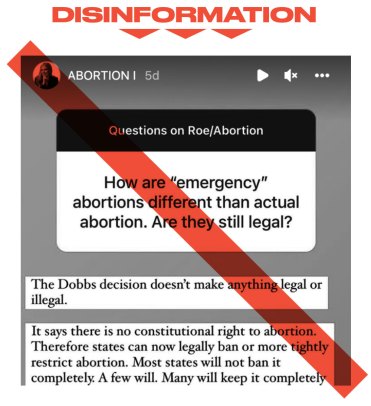Late last month, shortly after the US Supreme Court stripped away federal protection for abortion rights, Dr. Christina Francis, an OB/GYN based in Fort Wayne, Indiana, took to Instagram with an urgent message: She wanted her followers to know that even in states where abortion will soon be illegal, doctors still would be able to terminate pregnancies to save the life of the mother. “Treating ectopic pregnancies or miscarriages or other life-threatening conditions in pregnancy is not the same thing as an abortion,” she said in a video she took of herself from inside a car. “This is very important to clear up because I know that many women are feeling fearful that they might not be able to receive life-saving care if they need it.” Commenters thanked Dr. Francis for her clarification. “The amount of people that don’t know the difference is disturbing,” said one. “So many people spreading false information. Thank you for sharing and educating!”
It’s not hard to see why the post took off: It came across as authoritative and reassuring during a period of great uncertainty. After the repeal of Roe v. Wade, many women and OBYGNs are very worried that they soon won’t be allowed to treat serious complications of pregnancy—like ectopic pregnancy, where a fertilized egg grows outside the womb. If left unattended because of concerns that removing it would be against laws prohibiting abortions, an ectopic pregnancy can potentially kill the mother if the pregnancy’s growth splits the fallopian tube in which it is most commonly housed. The calm clarity from Dr. Francis gave the impression of offering a clear path forward. In the days after she posted her video, it went viral on Instagram and TikTok.
But Dr. Francis left out a few key pieces of information about herself: She is a member of the anti-choice organization American Association of Pro-Life Obstetricians and Gynecologists (AAPLOG), as well as the anti-choice think tank Charlotte Lozier Institute. Her video was part of an all-out disinformation campaign by the anti-abortion movement to minimize the impact of the ruling on Roe—with an assist from powerful social media influencers who built their brand by spreading disinformation about Covid.
In addition to claiming that the law won’t affect pregnant women whose life is in danger, some influencers promote other false narratives downplaying the potential ramifications of the decision, assuring their followers that their access to contraceptives will be untouched, and their own lives won’t change. But that’s misleading, says Dr. Marta Perez, a board-certified OBGYN based in Austin, Texas. Now that Roe has been repealed, she explains, “even normal reproductive health care is going to have an extra layer of complexity and barriers.” People dealing with unexpectedly thorny pregnancies will have a harder time finding the care and treatment they need, no matter what their views on abortion might be. And there is some indication that not everyone would support abortions for conditions that endanger mothers: On July 16, three weeks after the Dobbs decision, Idaho Republicans at their annual convention voted to reject an amendment to their platform that would have made an exception to allow abortions that would save the life of the mother. The margins weren’t even close: 412 delegates voted no to the amendment, while just 164 voted yes.
“Anyone who has worked in reproductive healthcare has had a patient who has told the doctor, ‘I’m anti-abortion,’ and has [later] needed or wanted an abortion.”
But even in places that do favor such exemptions, the difference between an abortion and a lifesaving pregnancy termination is not as stark as anti-abortion crusaders claim, Dr. Perez says. “Anyone who has worked in reproductive healthcare,” she says, “has had a patient who has told the doctor, ‘I’m anti-abortion,’ and has [later] needed or wanted an abortion.”



